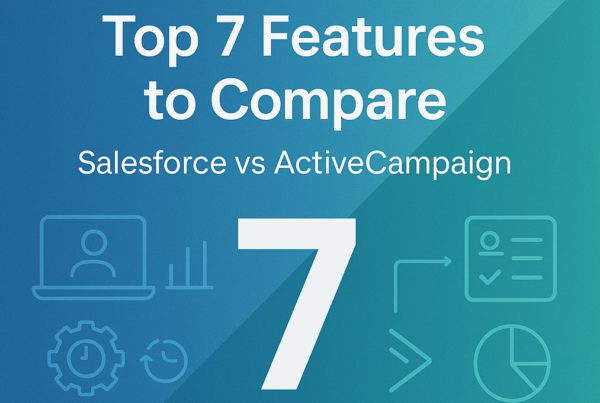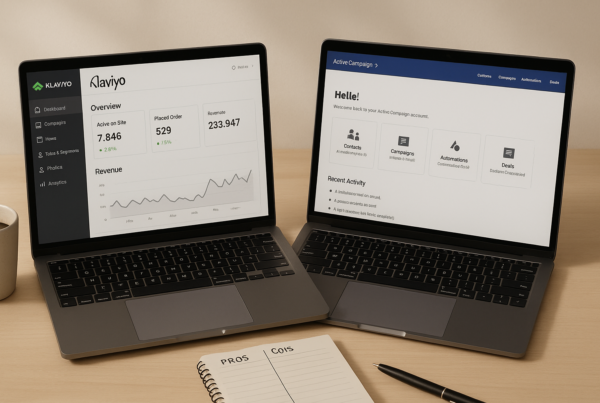When comparing BigCommerce vs Volusion for your e-commerce store, the advertised pricing is just the tip of the iceberg. BigCommerce is trusted by over 60,000 brands and offers a starting price of $29 per month, while Volusion begins at $35 per month. However, these base prices don’t tell the complete story.
Beyond the monthly fees, we’ve discovered significant differences in what each platform includes. BigCommerce provides SSL certificates and essential marketing features with all plans, maintaining an impressive 99.99% uptime. Meanwhile, Volusion charges an additional $89 for SSL certificates and restricts key features, such as abandoned cart emails, to higher-tier plans. When it comes to design options, BigCommerce offers 60 themes (12 of which are free), whereas Volusion provides 45 themes (11 of which are free), with some premium themes costing up to $895.
In this comparison, we’ll delve into the actual costs and value of these platforms, enabling you to make an informed decision that aligns with your business needs and budget. Whether you’re concerned about Volusion pricing tiers or curious about BigCommerce payment methods, we’ve got you covered.
Comparison Table: Bigcommerce vs Volusion
| Feature/Aspect | BigCommerce | Volusion |
| Starting Price | $29/month | $35/month |
| Available Plans | Standard, Plus, Pro, Enterprise | Personal, Professional, Business, Prime |
| Revenue Limits | Standard: $50K, Plus: $180K, Pro: $400K+ | Personal: $50K, Professional: $100K, Business: $400K |
| Themes | 60 themes (12 free) | 45 themes (11 free) |
| SSL Certificate | Included in all plans | Additional $89 charge (or sold separately, but sometimes included on all plans depending on source) |
| Ease of Use Rating | 4/5 | 5/5 |
| Interface Style | Left-side menu with drag-and-drop editors | Top menu navigation |
| Marketing Features | Built-in blogging – SEO tools, Abandoned cart recovery, Omnichannel selling | CRM tools (higher tiers), Affiliate program, E-newsletter, No native blogging (requires integration for full blogging) |
| App Marketplace | 850+ integrations | 70-80 integrations |
| Customer Support | 24/7 support via email, phone, and chat | 24/7 email and phone, limited chat hours |
| Security | PCI DSS 4.1 Level 1 compliant, Free SSL certificates, Multiple ISO certifications, Fraud protection tools | SSL certificates sold separately (though some sources say included), Recent security breach (2019-2020), PCI compliant, Daily backups |
| Uptime | 99.99% | Not explicitly mentioned as a percentage, but generally reliable; sometimes stated as “99.9% uptime guarantee” based on Google Cloud Platform hosting. |
| Mobile Optimization | AMP support with 88% faster load times | No AMP support (themes are mobile-responsive) |
| Setup Process | Guided step-by-step onboarding | Manual configuration with store builder tool |
Ease of Use and Setup Experience
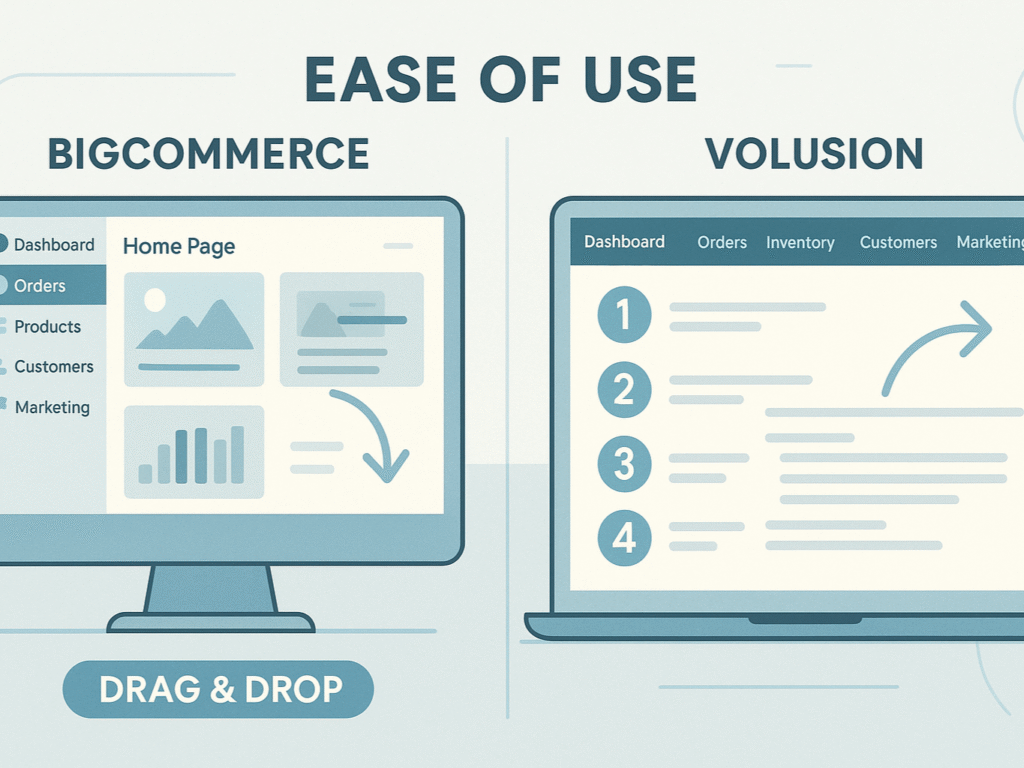
The fundamental usability of an e-commerce platform can make or break your online business experience. Comparing Bigcommerce vs Volusion reveals apparent differences in how each platform approaches user experience.
Dashboard Navigation: Drag-and-Drop vs Menu-Based UI
Volusion features a clean, top-navigation dashboard that’s easy to follow, offering a user-friendly experience for beginners. BigCommerce, on the other hand, uses a left-hand menu with tools on the right. Its intuitive drag-and-drop editor allows users to arrange content easily without needing any coding experience.
However, Volusion users often face challenges when switching between the front and back ends of their websites. This disconnect can create confusion and usually requires extra support. BigCommerce’s layout, though slightly more complex at first, becomes more efficient as users grow comfortable, especially for those managing large or expanding stores.
Store Setup: Guided Onboarding vs Manual Configuration
BigCommerce stands out with a guided setup process that walks new users through store creation step-by-step. From sign-up to configuration, it provides immediate direction, helping merchants quickly understand the platform’s features. Volusion also supports beginners, focusing on a no-code builder for storefront design and a simplified interface.
- BigCommerce offers a structured onboarding process to ensure a smooth setup.
- Volusion emphasizes drag-and-drop storefront design simplicity.
- BigCommerce includes 24/7 support and extensive documentation access.
Though both platforms assist new users, BigCommerce’s structured approach, combined with round-the-clock support, gives it a notable edge. Its comprehensive help center and responsive customer service allow users to troubleshoot setup issues more efficiently, making the early stages of building an online store less overwhelming and more streamlined.
Learning Curve for Beginners and Non-Tech Users
Despite its robust toolkit, BigCommerce receives a 4/5 ease-of-use rating because its advanced capabilities may overwhelm beginners. Volusion scores higher at 5/5 for user-friendliness, making it a preferred choice for small businesses. Its simpler dashboard suits users focused on basic setup and store management tasks.
For non-technical users, Volusion’s clean layout and intuitive controls often result in a quicker onboarding process. BigCommerce, while offering greater power, comes with a steeper learning curve. The choice depends on your goals: ease today or growth tomorrow.
However, this simplicity comes with trade-offs in terms of functionality and scalability, as explored in our Volusion vs. Wix comparison, which demonstrates how different platforms strike a balance between ease of use and advanced features.
- Volusion simplifies product uploads and inventory tracking.
- Payment setup is quicker and more guided on Volusion.
- BigCommerce favors developers and businesses with scaling in mind.
While Volusion wins for instant usability, BigCommerce is built for expansion. As your needs grow, its deep customization, third-party integrations, and advanced tools prove more valuable. The right platform depends on whether you prioritize speed now or flexibility later.
Feature Set and Customization Options
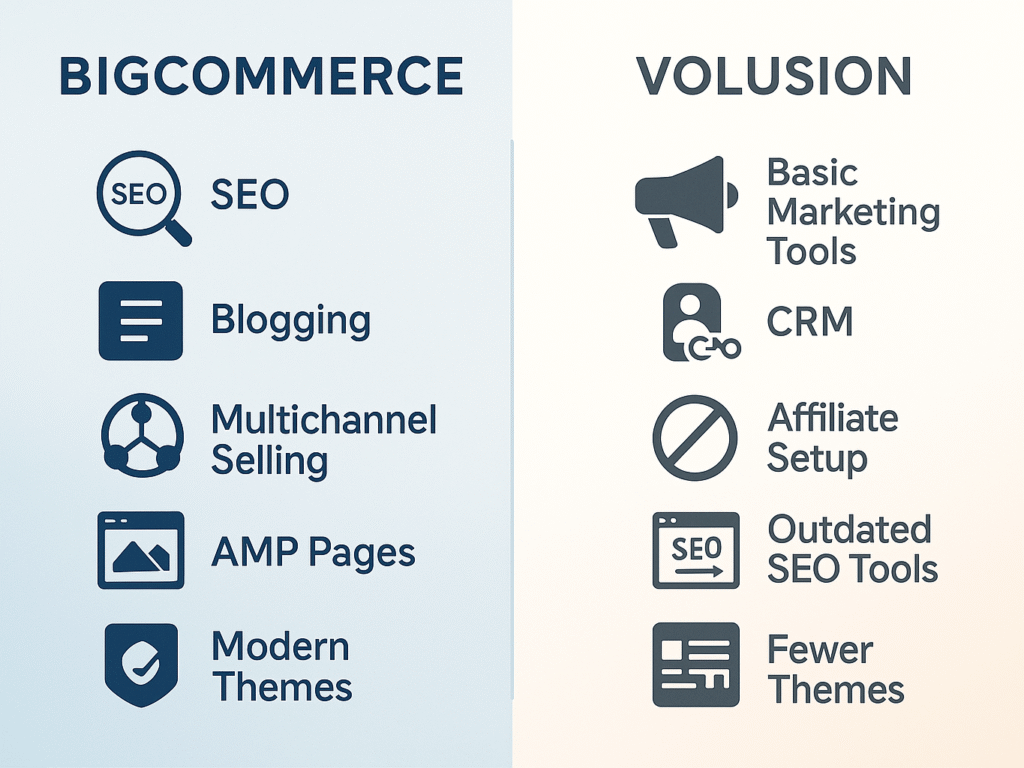
The features and customization options of an e-commerce platform ultimately determine your store’s long-term success and scalability. When examining BigCommerce vs Volusion, substantial differences emerge in their core capabilities.
Marketing Tools: Built-in vs Add-on Features
BigCommerce includes built-in SEO, blogging, and multichannel selling on platforms like Facebook and Amazon. It also supports abandoned cart recovery and email marketing, streamlining essential tools for digital growth.
Volusion provides basic marketing tools and unique CRM options on higher plans. It also allows affiliate setup and e-newsletter functionality, appealing to users focused on direct customer engagement and retention.
However, Volusion lacks a native blogging tool, requiring third-party integrations for content marketing. This limitation affects long-term SEO strategies and makes BigCommerce more comprehensive for businesses investing in organic traffic. The absence of built-in blogging capabilities is just one of several concerns highlighted in our detailed Volusion review, which examines how these feature gaps affect overall platform value and user experience.
SEO Capabilities: AMP Support vs Search Variables
BigCommerce stands out with superior SEO optimization tools, offering complete control over meta tags, custom URLs, and heading tags. Most notably, it supports Accelerated Mobile Pages (AMP), which can reduce mobile load times by up to 88%. Volusion lacks AMP support and uses outdated search variables instead of direct keyword control.
- BigCommerce improves mobile SEO with AMP and faster page speeds.
- Volusion’s limited SEO tools may hinder visibility and ranking.
- BigCommerce supports custom 301 redirects and rich snippets out of the box.
These differences make BigCommerce a stronger choice for businesses focused on organic growth. Its modern SEO features, combined with advanced control over mobile performance, give stores a competitive edge. Volusion’s outdated tools and lack of AMP support could limit visibility, especially for users who heavily rely on mobile traffic and search engine rankings.
Theme Variety: 60 BigCommerce Themes vs 45 Volusion Themes
BigCommerce offers 60 professionally designed themes, including 12 free options and multiple color variants for each theme. This variety makes it easier for store owners to find a layout that fits their brand without needing custom development.
Volusion offers 45 themes, including 11 free options, but lacks flexibility in color schemes. While both platforms offer mobile-responsive designs, BigCommerce’s themes tend to feel more modern and polished, making it the preferred choice for visually driven e-commerce brands.
Customization Flexibility: HTML/CSS Access and Styling Options
Both platforms support HTML and CSS editing for full customization. BigCommerce features a drag-and-drop editor and the powerful Stencil CLI for safe, advanced edits. Volusion offers a WYSIWYG editor suited for non-coders, but with fewer integration and extension options.
- BigCommerce supports over 850 third-party apps and integrations.
- Volusion offers around 70 integrations, limiting flexibility.
- BigCommerce enables safe theme testing without affecting live sites using the Stencil CLI.
BigCommerce leads in extensibility, allowing merchants to build more advanced, scalable stores with minimal limitations. Its app marketplace spans marketing, fulfillment, analytics, and more, empowering users to expand functionality as business grows. Volusion’s smaller integration library restricts growth opportunities over time.
While Volusion offers basic customization for beginners, BigCommerce’s powerful editing tools and integration ecosystem make it a better fit for growing or tech-savvy businesses seeking complete control and long-term flexibility.
Pricing Transparency and Hidden Costs
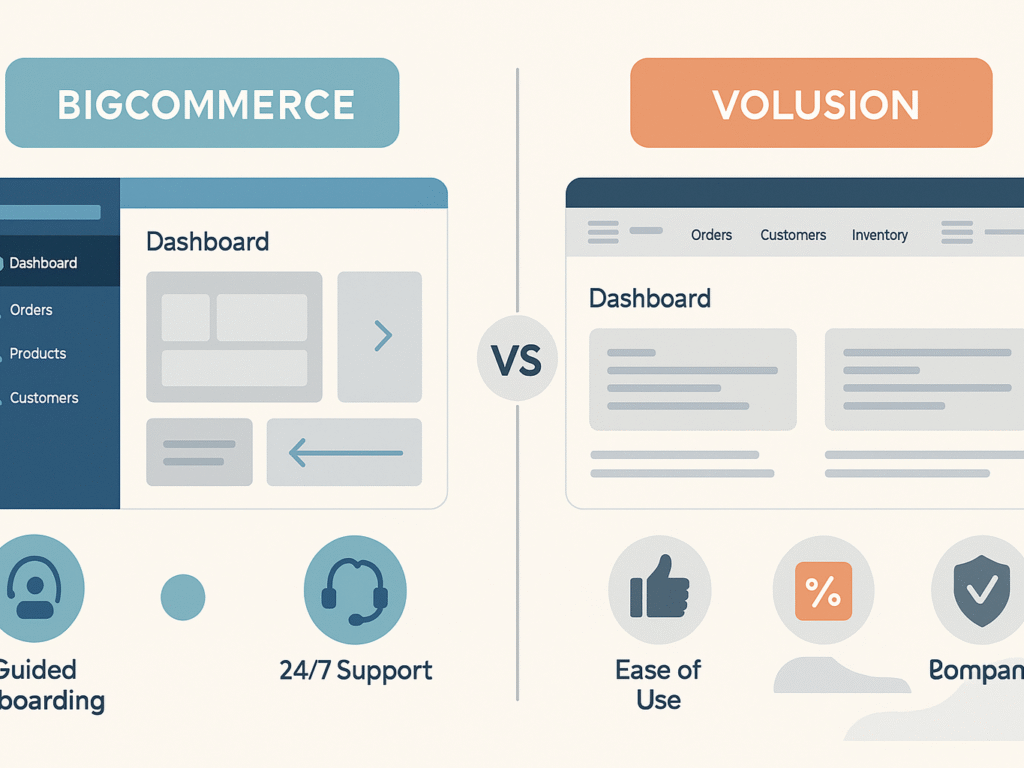
Understanding pricing structure goes beyond the advertised monthly fees when selecting an e-commerce platform. Examining BigCommerce vs. Volusion reveals substantial differences in the actual costs you pay.
Volusion Pricing Tiers: Personal to Prime Plans
Volusion offers four pricing tiers: Personal ($35 per month), Professional ($79 per month), Business ($299 per month), and Prime (custom pricing). The Personal plan includes 100 products and one staff account. The Professional plan expands to 5,000 products with five staff accounts, while the Business plan allows unlimited product listings and more operational flexibility. For a detailed breakdown of each plan’s features and limitations, refer to our comprehensive Volusion review, which covers real user experiences and hidden costs.
However, all Volusion plans include strict revenue-based limits, known as Gross Merchandise Volume (GMV) caps. Personal plans cap at $50,000 annually, Professional plans at $100,00Businessusiness plans at $400,000. Once your store exceeds these thresholds, Volusion automatically requires you to upgrade, even if you don’t need additional features, making scaling more expensive.
Volusion Review 2025: Is This ECommerce Builder Still Worth It?: Discover the complete breakdown of Volusion’s features, pricing, and performance in our comprehensive 2025 review. We analyze real user experiences, hidden costs, and platform limitations to help you make an informed decision for your online store.
BigCommerce Plans: Standard to Enterprise
BigCommerce offers four pricing tiers: Standard ($29), Plus ($79), Pro ($299), and Enterprise (custom pricing). A 25% discount is available for annual billing. These plans offer more flexibility than Volusion, especially for growing stores seeking generous sales volume thresholds without compromising core functionality.
Revenue caps are set at $50,000 for Standard, $180,000 for Plus, and $400,000+ for Pro. Unlike Volusion, BigCommerce does not limit features based on the plan you choose. Instead, all essential tools remain available, and upgrades primarily depend on sales volume, rather than product limits or staff access.
- 25% discount for annual billing
- No restrictions on feature access across plans
- Revenue limits are higher than Volusion’s at each tier
This structure makes BigCommerce ideal for scaling businesses. With fewer restrictions and predictable pricing, users can focus on growth without worrying about losing tools or being forced into expensive upgrades to access standard features.
Hidden Fees: SSL, Bandwidth, and Cancelation Charges
Volusion charges extra for essentials like SSL certificates, which start at $89. Additional fees may apply for cancellations, email usage, migrations, or exceeding bandwidth, making it difficult to predict long-term costs for growing businesses.
These hidden costs often surprise users and can quickly add up. Volusion has been described as “a web of fees and penalties” due to its complex and layered pricing model, which varies across different features and services.
BigCommerce offers a more transparent pricing structure. SSL certificates and unlimited bandwidth are included in every plan, with no surprise charges. It makes it more cost-effective and predictable for merchants planning to scale their operations.
Included vs Paid Features: Abandoned Cart, CRM, and Email Tools
Essential marketing tools are critical for conversion, yet Volusion hides many of them behind expensive plans. Abandoned cart recovery, CRM tools, and customer reviews require a Professional or higher-tier subscription. BigCommerce, however, includes these features in its Plus plan, making it a more budget-friendly choice for serious e-commerce growth.
- Abandoned cart recovery is locked behind Volusion’s $79/month plan
- CRM and customer reviews are not available on lower Volusion tiers
- BigCommerce includes all three features in its $79/month Plus plan
For stores focused on scaling, BigCommerce delivers better overall value. Merchants gain immediate access to vital tools without surprise paywalls or forced upgrades. In contrast, Volusion’s tiered access can slow your growth and increase costs over time. If functionality is a priority early on, BigCommerce wins with its inclusive approach.
Support, Security, and Scalability
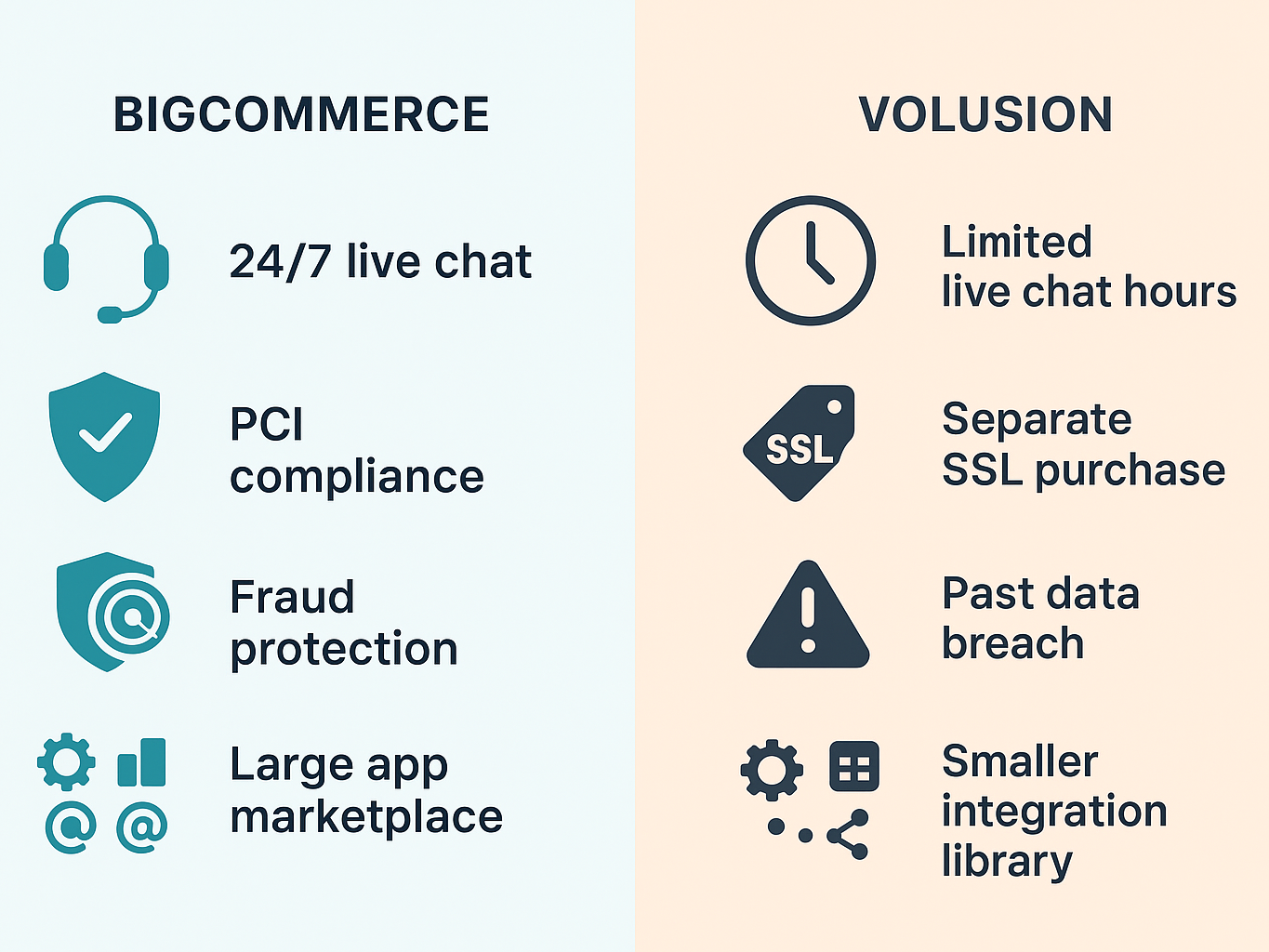
Reliable customer support and robust security form the backbone of successful e-commerce operations. Examining BigCommerce vs Volusion reveals substantial differences in how these platforms approach these critical aspects.
Customer Support Channels: 24/7 Chat vs Limited Live Chat
BigCommerce provides 24/7 customer support across all plans through phone, email, and live chat. Their support team resolves 85% of issues on the first contact, reducing merchant delays. Additionally, BigCommerce offers extensive educational resources, including YouTube tutorials, webinars, community forums, and a detailed Resource Center, providing opportunities for self-guided learning.
Volusion also offers 24/7 support via phone and email, but live chat is only available during limited hours. Priority support is reserved for Business plan users and above, creating a tiered support experience. While they do provide documentation and a help center, the quality and availability of these resources can vary depending on the plan level.
Both platforms include self-help tools, but BigCommerce consistently receives higher ratings for clarity and depth of information. Its support infrastructure is more robust overall, making it easier for merchants to resolve issues quickly and learn independently. For store owners seeking fast and reliable assistance, BigCommerce offers a clear advantage in customer support.
Security Features: PCI Compliance and Fraud Protection
BigCommerce offers stronger built-in security, including PCI DSS 4.1 Level 1 compliance, ISO certifications, and advanced fraud protection tools. It also includes free SSL certificates on all plans, whereas Volusion requires separate SSL purchases, which increases long-term security costs for merchants.
- BigCommerce includes SSL certificates at no extra cost
- Volusion’s SSL must be purchased separately
- BigCommerce is certified for PCI DSS 4.1 Level 1
- Volusion experienced a major breach affecting 6,500+ stores
Volusion’s 2019–2020 data breach exposed approximately 20 million customer records, raising serious concerns about trust and safety. In contrast, BigCommerce prioritizes proactive data protection and regulatory compliance, making it a more secure choice for businesses handling sensitive information and large volumes of transactions. This security difference becomes even more apparent when comparing Volusion to other platforms. Our Volusion vs. Shopify analysis reveals how these security issues impact merchant confidence and customer trust.
Shopify vs. Volusion: An Honest Comparison for New Store Owners – Considering Other Platforms? Our detailed Shopify vs Volusion comparison reveals which platform offers better value for beginners. Compare features, pricing, and scalability to find the perfect fit for your new business.
Scalability: API Access and Developer Tools
BigCommerce is built for growth. It offers robust API access, advanced developer tools, and 99.99% uptime, making it ideal for high-traffic stores and extensive product catalogs. Its infrastructure supports complex operations, offering the flexibility and reliability that expanding e-commerce businesses need to scale without technical limitations or frequent downtime.
In contrast, Volusion lacks the same scalability. It struggles with complex integrations and larger store demands, which may hinder long-term growth. BigCommerce also excels in multichannel selling, supporting Amazon, eBay, Facebook, and Instagram natively. For merchants with future expansion goals, BigCommerce presents a more future-proof and scalable e-commerce solution.
App Marketplace: 320+ BigCommerce Apps vs 80+ Volusion Plugins
The integration ecosystem shows marked differences:
- BigCommerce features 320+ apps, some sources citing closer to 600 or 850
- Volusion offers approximately 80 integrations, with some sources noting just 75 apps
Ultimately, BigCommerce offers significantly more options for extending store functionality, including popular accounting tools like Xero, which Volusion lacks. This limitation becomes particularly challenging when compared to other website builders, as detailed in our Volusion vs Wix comparison, which examines how app ecosystems impact long-term growth.
Volusion vs Wix: 8 Performance Metrics Broken Down: Looking at website builders, too? Our performance analysis of Volusion vs Wix covers speed, SEO capabilities, and conversion rates. Gain data-driven insights to select the platform that’ll effectively boost your online sales.
BigCommerce vs Volusion: Pros & Cons
| Feature/Aspect | BigCommerce (Pros) | BigCommerce (Cons) | Volusion (Pros) | Volusion (Cons) |
| Ease of Use | User-friendly interface with clean navigation | Slightly steep learning curve for beginners | Simple for basic users | Outdated UI and harder editing tools |
| Design & Themes | 170+ responsive themes (12 free) | Premium themes are expensive | Around 30 themes, all mobile-responsive | Limited variety and design flexibility |
| Pricing | Transparent pricing; no transaction fees | Higher monthly costs for enterprise plans | Cheaper mid-tier plans | Charges extra transaction fees |
| Product Limit | Unlimited products on all plans | Limited to 100 products on Personal plan | Needs upgrades for scalability | |
| Apps & Integrations | 1,000+ apps in marketplace | Less variety than Shopify | Smaller app store | Only 84 apps; fewer integrations |
| SEO Tools | Robust SEO features, customizable URLs & meta | Some advanced options need apps | Basic SEO available | Lacks control over SEO for static pages |
| Sales Features | Built-in tools: abandoned cart, gift cards, reviews | May require apps for advanced features | Inventory and tax tools built-in | Abandoned cart only on higher plans |
| Mobile Support | Fully mobile-optimized + PWA features | Some features best on desktop | Responsive themes included | No mobile app or advanced mobile tools |
| Support | 24/7 support via chat, email, phone | Occasional slow response during peak times | Offers onboarding help | No 24/7 support, limited channels |
| POS Support | Native POS with hardware options | Requires subscription for advanced POS | No built-in POS support | Must use third-party solutions |
| Blogging Capability | Built-in blogging platform | Not as advanced as WordPress | No blogging feature included | Requires third-party integration |
Volusion Review 2025: Is This eCommerce Builder Still Worth It?: Still unsure about Volusion? Our in-depth 2025 review examines every aspect of this platform, from setup to scaling. Read honest user feedback and expert analysis to determine if Volusion aligns with your business goals.
Conclusion
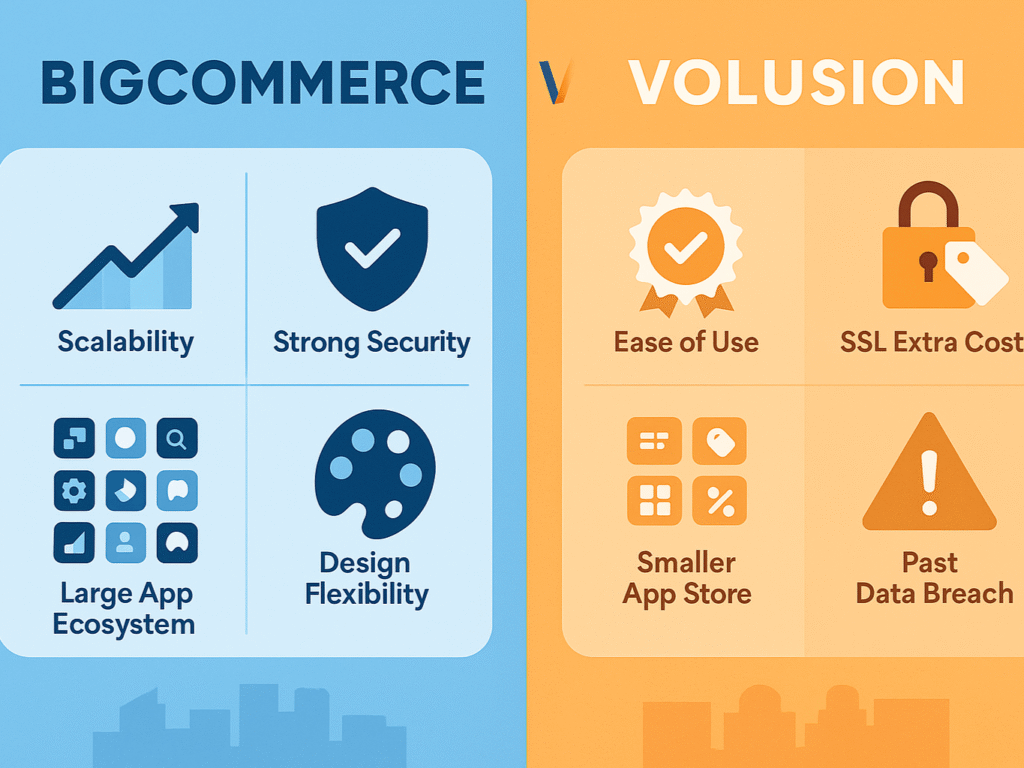
BigCommerce and Volusion differ in more than just pricing. While BigCommerce starts at $29 per month and Volusion at $35 per month, the value gap widens due to hidden costs. Volusion charges $89 for SSL certificates and limits features like abandoned cart recovery to higher-tier plans, while BigCommerce includes these essentials in its mid-tier options.
Ease of use slightly favors Volusion with a perfect score, but BigCommerce shines in scalability. It supports growing businesses with developer tools, robust APIs, and a 99.99% uptime guarantee. Design-wise, BigCommerce also leads with 60 modern themes, compared to Volusion’s 45, offering a better visual appeal and greater flexibility through color variations and HTML/CSS control.
Where BigCommerce pulls ahead is in its app ecosystem, offering over 850 integrations compared to Volusion’s 80. Security is another major factor, as Volusion suffered a significant breach in 2019-2020. For long-term growth, BigCommerce stands out as the superior choice, offering more features, enhanced security, and greater scalability with fewer limitations.
FAQs On BigCommerce vs Volusion
1. What are the starting prices for BigCommerce and Volusion?
BigCommerce’s entry-level Standard plan starts at $29 per month, making it slightly more affordable than Volusion’s plan, which costs $35 per month. Additionally, BigCommerce offers a 25% discount for annual billing, providing better long-term savings for businesses looking to scale without incurring significant costs.
2. What additional costs should be considered for Volusion?
Beyond the monthly subscription, Volusion charges $89 or more for SSL certificates. It also locks essential features, such as abandoned cart recovery, CRM tools, and product reviews, behind higher-tier plans. These extra costs can quickly add up, making Volusion less budget-friendly for growing e-commerce businesses compared to BigCommerce.
3. How do BigCommerce and Volusion compare in terms of ease of use?
Volusion earns a 5/5 rating for ease of use, favored by beginners for its clean interface and simplicity. BigCommerce scores slightly lower at 4/5 but compensates with more robust tools. While Volusion is easier initially, BigCommerce becomes more manageable as your store grows and requires advanced features.
4. Which platform offers more themes and customization options?
BigCommerce provides 60 modern themes, including 12 free ones with flexible layouts and color variations. Volusion offers 45 themes, 11 of which are free, but it lacks variety and visual appeal. BigCommerce also supports greater design flexibility through HTML/CSS editing and a more advanced drag-and-drop page builder.




